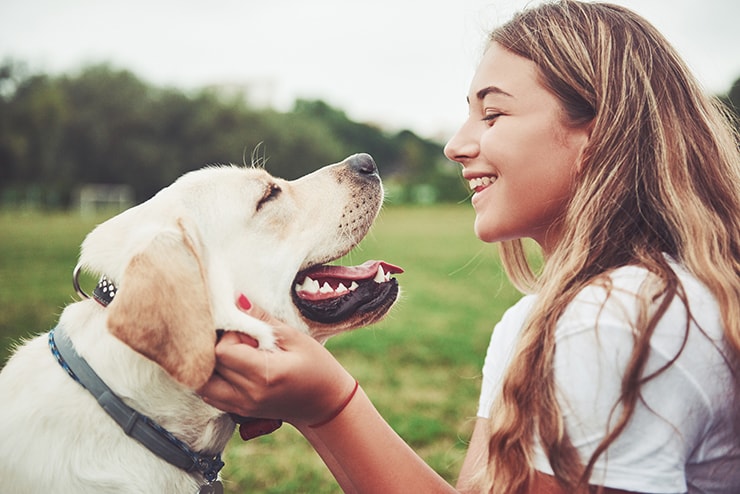Dogs’ mouths are cleaner than humans’: urban myth, or is there some truth there? Either way, we’ve all likely heard the statement before, and promptly pictured our furry friend licking themselves or eating dirt.
The answer, as it turns out, is a little more complicated, especially considering there are a few different ways to define “clean.” According to a 2017 article published in National Geographic, humans have between 400 and 500 bacteria species in our mouths (ew!). In comparison, dogs typically have around 400 species and cats just have 200, though not all species have been identified. Overall, we have different species of bacteria than in our cats’ and dogs’ mouths, so it’s best to avoid letting your pets lick you, especially on your face or if you have an open wound.
What’s in My Pet’s Mouth?
Because the bacteria in your cat and dog’s mouth is naturally occurring, you don’t have to worry about the bacteria making them sick. It doesn’t even play a major role in their bad breath. As long as you’re not letting your pet lick open wounds or the inside of your mouth or bite you, you shouldn’t be worried about the bacteria, either. However, if you do get bitten by any animal, you should clean the wound immediately and visit a doctor.
In dogs’ mouths, the most worrisome bacteria is Capnocytophaga canimorsus. While it’s incredibly rare for the bacteria to infect you, it can cause some major complications, and can necessitate limb amputation in the most severe cases. Cats also have C. canimorsus in their mouths, but the more common disease to contract from Fluffy is Bartonella henselae. B. henselae, commonly called cat scratch disease, is less serious than C. canimorsus.
If you’ve been bitten or scratched by your pet, you should always consult your primary care physician, especially if you’re experiencing flu-like symptoms, body aches or soreness, a fever, or swollen lymph nodes.
How to Reduce Bacteria in Your Mouth
While we stick to human patients here at My Hills Dentist, we do have one thing in common with vets; we both recommend our patients brush their teeth often. Humans should brush their teeth twice every day. And, yes, while there are hundreds of natural bacteria in your mouth, you should still do your best to keep your mouth as clean as possible and be mindful about your oral health.
Getting rid of all the bacteria in your mouth is impossible and, frankly, unhealthy, as many healthy bacteria help you break down food. The bad bacteria, however, can cause problems. Allowing bad bacteria to fester in your mouth can enable plaque buildup, which can lead to loss of bone mass in your teeth and jaw, gingivitis, periodontitis, and other ailments. Here are just a few ways you can keep your mouth clean and reduce your bad bacteria:
- Brush your teeth twice a day
- Floss daily
- Visit your dentist twice each year for a cleaning
- Rinse your mouth daily with mouthwash
- Drink water with fluoride
- Maintain a healthy, nutrient-rich diet
- Use preventive measures like white fillings
Keep Your Mouth Cleaner Than Spot’s
It’s a relief to know our mouths aren’t quite comparable to your dog’s and the “your dog’s mouth is cleaner than your own” myth can be dispelled. Still, it never hurts to reassess your oral health.
If you’re interested in hearing a second opinion on your teeth, need an appointment for a regular dental cleaning or are ready to take your oral health to the next level, the professional dentists at My Hills Dentist can help. To schedule an appointment with My Hills Dentist in Baulkham Hills today, please call (02) 9686 7375 or click here to book an appointment online.


